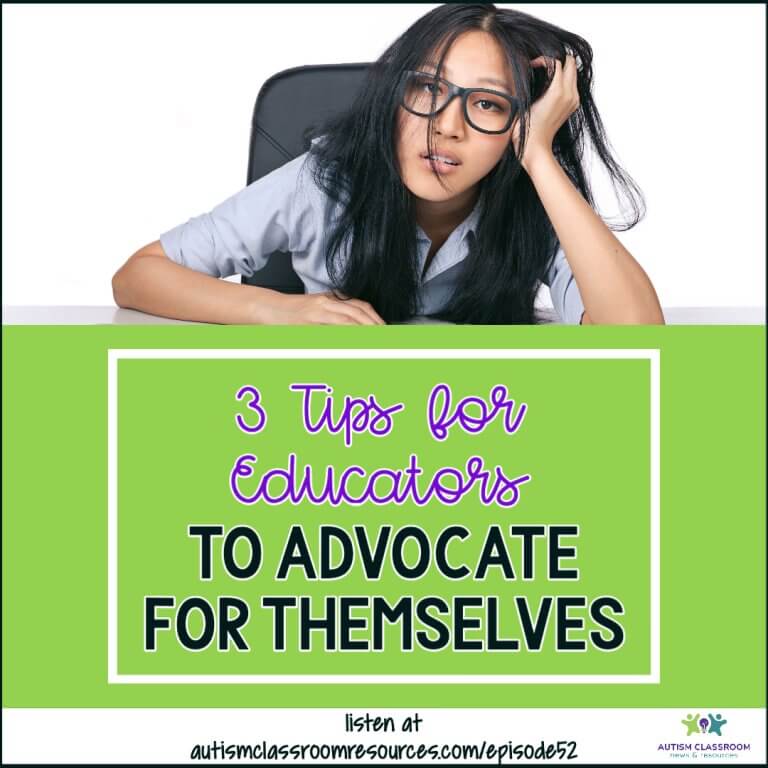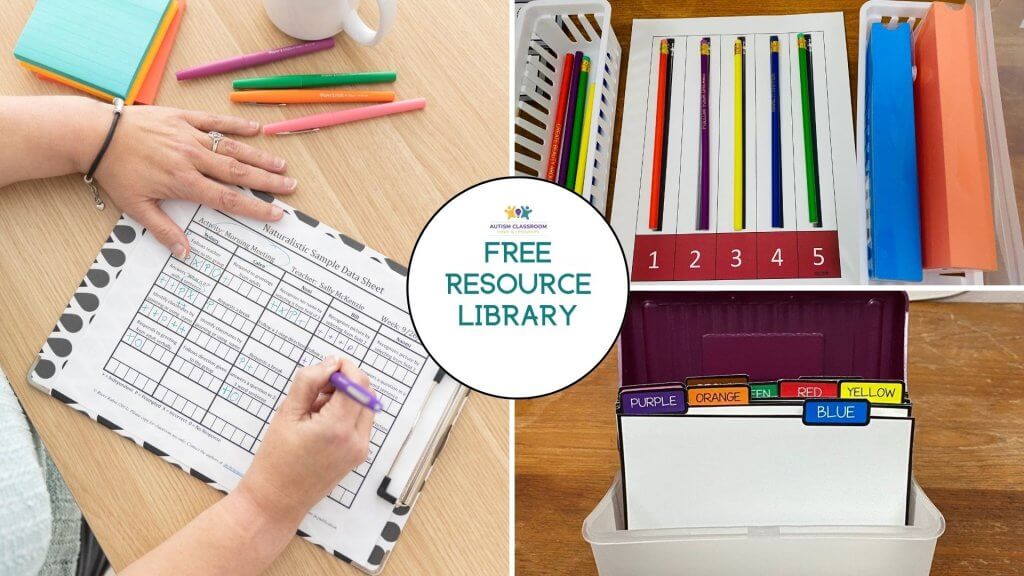One of the questions I’m hearing a lot right now is how can special educators advocate for their needs (and thereby the needs of their classroom as well. It’s hardly surprising given that we are in the middle of the most difficult year of teaching I can remember in my 30 year career. But what’s interesting is there are lots of articles out there about how to teach students to ask for help, how to teach parents to advocate, how teachers can advocate for their students (I’ll have more on this in a future episode). But there are few tips I can find out there about how teachers should ask for help for themselves.
Teaching is hard. You know it’s true…I believe (especially right now) it’s one of the hardest jobs there is. And to do it well, it is essential that special educators advocate for themselves. Educators never cease to amaze me with their ingenuity and grit. But truly, no one can do this job alone. Our special education system is actually built to keep it from being a one-man show. And yet many times our classrooms feel like an island with no where to turn for help.
Why Teachers Don’t Self-Advocate
Asking For Help Signals Weakness
I know that special educators have lots of concerns about asking for help. There is the classic fear that asking for help makes you look weak–and in teacher language, that means looking like you aren’t a good teacher. And that’s just cray cray. In fact, asking for help reflects that you are strong enough to recognize you need help and confident enough to ask for it. But that doesn’t make it easy to do.
“Don’t be afraid to ask questions. Don’t be afraid to ask for help when you need it. I do that every day. Asking for help isn’t a sign of weakness, it’s a sign of strength. It shows you have the courage to admit when you don’t know something, and to learn something new.”
Barack Obama
Administrators are Unreceptive
Another reason is that teachers fear that their administrators will not be receptive to their request for help. I remember one time when I was a grad student reaching out to a supervisor in our clinic, telling her I didn’t feel like I could adequately meet a client’s needs. Her response was to tell me that I was probably doing better than community practitioners because I was concerned about it. That wasn’t the help I needed and it didn’t make me feel any better. Consequently I didn’t go back to her when I needed help (not the quality you want to engender as a supervisor by the way).
Educators Don’t Know Specifically What They Need or How to Ask
Sometimes educators don’t know how to frame the request in a way that gets them the support they need. It might be they don’t know what they need. They know that something is wrong (or have been told something is wrong) but don’t know specifically how to fix it. Or they might not know how to phrase it in a way that makes the request powerful to the administrator.
Quality of Supervisors
Needless to say, all of the supervisors in the above reasons are not doing a great job. And the quality of the supervisor or administrator is a huge component in job satisfaction. It’s also critical to gaining the support you need in the classroom when you ask. Just as a supportive high-quality teacher makes a difference in the life of a student, the support and leadership skills of the principal and special educators make or break whether teachers succeed and remain in the school.
Job Security
And finally, many teachers don’t ask for help because they are scared of losing their job. There is a feeling that they point out something wrong in the system that they will be penalized for it. Or if they reveal the fact that they don’t know how to handle something, they will graded down in evaluations.
Episode 52 Highlights
Educators can’t do this job alone. It’s not designed to be done on an island. Education is, by nature, a collaborative process. But I know that sometimes special educators, in particular, feel like they are working on a island. Having established some of the reasons educators don’t advocate for themselves, in this episode, I’m talking specifically about how you, as a special educator, can ask for help for you and for your classroom. As usual, I don’t begin to pretend I have all the answers. But I do have 3 strategies that I think can help you frame requests for help and support in your everyday work life that make getting that support more likely.
The strategies I’m talking about will not work for everyone and every situation. Sometimes the issues are bigger than just needing help. If you are struggling with burnout in general or in a job you aren’t sure about, you might want to try these tips for preventing burnout and these for reducing stress. The issue of the quality of leadership of administrators is a big one. And while I can’t fix that one, these suggestions can perhaps reduce its impact on your everyday life.
3 Ways Special Educators Advocate for Their Needs Effectively
Let me start by saying that I think it’s critically important that special educators advocate for their students. That is another area where it sometimes feels like you are rocking the boat. I will address ways to advocate for students’ needs in a future episode. I believe it’s also critical to discuss and tricky to navigate. However, in talking about advocating for yourself as an educator, I think it’s important to remember that it is tied to advocating for your classroom or caseload. Thereby, advocating for yourself is also advocating for your classroom and your students. I mean, assuming you aren’t advocating for 3 hours lunches and a shorter work day.
Typically, when educators advocate for their needs, those same supports will help their students. One of the biggest areas that teachers advocate for is more adult support or help. And often when you are advocating for something for your students, it will hopefully make your life (and that of your staff) easier.
#1 Know What You Need
This sounds simple, but it’s really not. Sometimes you know you are overwhelmed but it’s hard to see exactly what would make it better. Especially if you are overwhelmed by everything going on, particularly now in fall 2020, it’s hard to see all the moving parts. Is the problem that your students aren’t showing up for distance learning? Perhaps the issue is that you are trying to do two jobs at once in hybrid teaching with online instruction and in-class instruction.
The most effective way to advocate for your needs in any situation is to be clear in your head and communication about the problem. For instance, It’s tempting to say that you are struggling with distance learning and it’s impossible to do. If the problem really is that you are struggling to keep up with getting material online for your distance learning students in a reasonable time frame, that’s what you need to advocate for. Administrators can’t help you if the problem is simply distance learning. Many of you are “stuck” with it for a while at the moment. But, they could help you troubleshoot the problem of time or the process of uploading material for the students.
How to Know What You Need
So how do you figure out what to advocate for specifically? Talk with others. Find out what other educators are doing or struggling with. Share your problem with an educator friend and talk through it. Sometimes that helps you to see where the specific problem lies. Knowing the specific problem that is underlying your concern, leads you to be able to plan out what you need.
#2 Plan Out What You Need and Demonstrate Its Impact
Let’s take an example where you are struggling to meet needs of your students with the current staffing. This is one I hear frequently, and have worked with many teachers over the years to help make this request. I’ve also been an administrator on the other side of this request, so I’ve seen it from different angles. The most successful method for advocating for any type of assistance in the classroom, or impact of any type of support, is to show what it would look like with and without that support.
Example of Advocating for More Staff
One of the most common things educators need to advocate for is more staff to support their classroom. Whether it’s a student they are struggling with specifically, or if the ratio isn’t adequate to support the needs, it’s probably the most frequent request. It’s also probably the most frequent request that is not granted. There are multiple reasons for that. It’s probably the first request of teachers when they feel overwhelmed. And it isn’t always really what is needed. And of course it is a budgetary issue that may not be feasible for the district.
So, how to approach this issue? Make a zoning plan that outlines what your staffing utilization looks like now. Then make another one that shows what your classroom could do with an extra staff member. Preparing both is more work (although you should already have a zoning plan), but it shows the administrator that you have thought through the problem. You have shown them what you plan to do with that extra staff. Asking for extra staff then isn’t a frivolous request. It also has the added element of allowing you to know that you advocated effectively. And that you told your supervisors what you could do with the staff you have and what the limits are. After all, you aren’t going to be granted every request you make, no matter how effective the advocacy. But this may help you live with the decision that gets made.
Tools for Planning it Out and Demonstrating Impact
As I mentioned in that example, a zoning plan is an excellent tool for making requests for staff. If we take the example of asking for assistance with a staff member who isn’t doing what needs to be done, zoning plans can help with that as well. You use a zoning plan to give direction to the staff. So you have put it in writing what the expectations are. You can grab the form for a zoning plan in the free resource library.
Another tool to use if you are struggling with a staff member is the Teaching Implementation Plan (TIP). The TIP gives more guidance about implementing a student’s IEP and assures you have given this information to the staff. It’s also helpful when advocating for help with addressing a parent because it shows how you have thought through the existing IEP.
The final tool that can be extremely helpful in advocating for anything is using your data. Need help from the behavior specialist with the behavior of a student in your classroom? Take your behavior data and show it to the person who needs to make the referral. Struggling with a student whose progress isn’t what you think it should be and think you need a different curriculum? Take your data on their progress (summarized of course) to support your request.
#3: Ask for Suggestions for Solutions
The third tip is one that comes into play when you are having trouble with #1 and defining what the problem is. It’s one I recommend most frequently when teachers are given feedback on an evaluation, for example, but don’t know how to address the problem. Let’s face it, sometimes you and your administrators will not see eye to eye on how things should be done in your classroom. And sometimes their suggestions (and evaluations) may make no sense to you in how you would do that with your classroom.
Now this can happen if you are a new teacher and what the supervisor, consultant or coach is recommending is something unfamiliar to you so you don’t know how it would help. It could also be something you have already tried. For instance, as a consultant I’ve often given a recommendation that we try a token system with a student. Sometimes the teacher will tell me she already tried it and it didn’t work. It’s then on me, as the consultant, to ask how it was implemented to see if that played a role. However, if I don’t do my job as a consultant (i.e., I just tell them to try again), it would be helpful for the teacher to say, “I’ve already done this. What could I change to make it work better?”
Why Asking for Suggestions is Key
I realize this puts a lot more pressure on you, as educators. But we know that the administrators and coaches you work with are under that much pressure as well. And they may not always see these issues as pressing. But most of them will come around if you ask for more information.
As an administrator, I would much rather work with a teacher to find a solution when he or she asks questions about how to make it work than a teacher who either ignores my advice or flatly refuses. Asking for suggestions shows that you want to make things better and address the concern. And it shares the responsibility for solving the problem between you and the supervisor.
Final Thoughts for Helping Special Educators Advocate for Themselves
So I’ve talked about 3 ways that special educators can advocate for themselves most effectively. There is one element that I haven’t focused on as much, but that underlies all three. You have to ask in order to get assistance. If you spend your time closed up in your classroom and don’t reach out for assistance when you need it, no one will know you need it. If you don’t tell someone that there is a problem, it’s highly likely in our crazy educational world that they will not notice.
Advocating is important not just for your satisfaction with your job and your stress level. Advocating for yourself is important because it’s the only way to make things better. If you don’t tell someone that you have a problem, they likely will not notice you need help. If you try to make everything look like you have it all under control when you don’t, the view from administration will be that you aren’t able to do the job. Unfortunately they won’t always look at your struggling as a cry for help. But they will look at your asking as a sign of strength. That is if they are a good leader. If they aren’t….that’s a topic for another episode.






